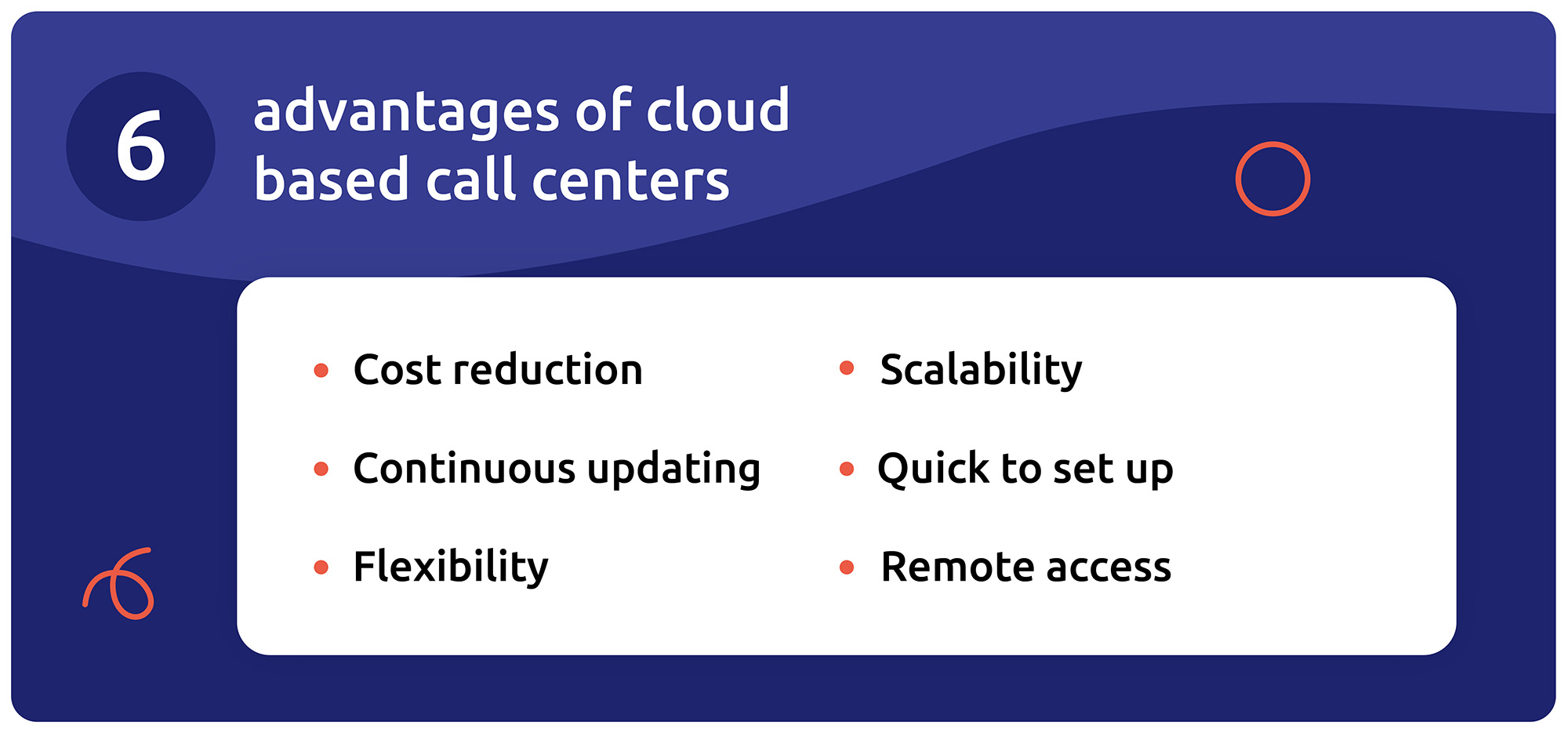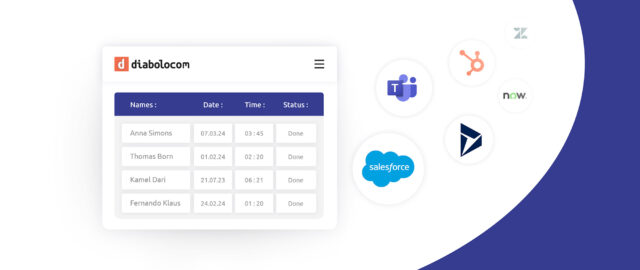The growing adoption of cloud based call centers by businesses
Cloud-based call center software, also known as CCaaS (Contact Center as a Service), is hosted remotely by the provider and accessed by users via a web browser.
The widespread shift from traditional call centers to cloud-based models is part of a larger trend towards cloud migration in enterprise software. By 2023, 89% of businesses are expected to utilize multiple cloud tools (source: Flexera).
This shift owes its success to the numerous benefits of cloud software, especially for call centers:
Cost Efficiency Boosts Adoption
The primary appeal is financial: cloud-based call centers are generally less expensive than traditional ones. This affordability stems from two factors:
- Cloud-based call centers operate on a subscription model, which minimizes upfront costs and spreads payments over the duration of use.
- Pricing for cloud-based call centers often includes a pay-per-use component. Costs vary based on the chosen features and usage volume, such as the number of outbound calls made.
Flexible and easy to set up
This leads us to the second major benefit: flexibility. A cloud-based call center is a scalable solution that adjusts to your business’s changing volume and functional requirements. You can begin with the basic features and gradually add more modules as your call center evolves and your operations become more complex.
Moreover, cloud-based call centers are quicker to deploy. Since the software is not installed on a company’s servers but hosted remotely, it can be accessed from any computer with an internet connection and a web browser.
Automatic updates
Cloud-based call centers also provide companies with continuous software updates, ensuring access to the latest features and technologies. These upgrades are managed by the service provider and automatically rolled out to customer systems.
Organizations of all sizes, from small businesses to large enterprises, can leverage cloud-based call centers. Companies can select the SaaS call center solution that best fits their needs, considering factors like budget, employee count, and required features.

6 advantages of cloud based call centers
If we could distill the benefits of a cloud-based call center into a concise list, here are the top six advantages for businesses.
1 – Cost reduction
Cloud-based call centers offer a more cost-effective solution compared to traditional call centers. Companies can cut down on infrastructure expenses since there’s no need to buy or maintain their own equipment.
2 – Continuous updating
Cloud-based call centers are continuously updated, giving companies access to the latest features and technologies without the need for costly upgrades on their part.
3 – Flexibility
Cloud-based call centers offer greater flexibility than traditional call centers. Companies can easily customize the service to meet their specific needs and adjust features as their business grows and changes.
4 – Scalability
Cloud-based call centers are highly scalable, allowing companies to effortlessly expand or reduce their capacity to match demand. This scalability means there’s no need for businesses to invest in extra equipment to manage increased loads.
5 – Quick to set up
Call center clouds can be set up quickly, which means companies can start offering customer service quickly. Companies don’t have to wait for their equipment to be installed and configured before they can start using their call center.
6 – Remote access
Finally, cloud-based call centers support remote access, allowing employees to connect from anywhere. This capability enables companies to offer around-the-clock customer service without maintaining a physical call center.
These six advantages underscore the success of cloud-based call centers. If you’re still considering your options, let’s explore the operational benefits and overall gains that this technology can offer your business.
3 reasons to use a cloud based call center
1 – The cloud based call center improves your teams’ day-to-day work
Cloud software streamlines the sales process by automating tasks, making life easier for teams and enhancing the management of customer interactions.
With a cloud-based call center solution, you can manage incoming calls by:
- Qualifying and prioritizing requests using an intelligent IVR system;
- Automating responses with self-service options;
- Routing queries to the most suitable advisor;
- Centralizing all data in a single interface for agents;
- Maintaining consistent information levels across all communication channels due to shared exchange histories;
- Enhancing your sales strategy with customized call scripts;
- Leveraging artificial intelligence for pre, during, and post-interaction handling, including features like virtual assistant, call transcription, and call summarization.
Additionally, cloud-based call center software streamlines the setup of outbound call campaigns:
- Facilitating direct dialing with click-to-dial;
- Choosing the optimal dialing mode—preview, progressive, or predictive;
- Enriching customer profiles through ongoing interactions and effective CRM integration;
- Automating calls, emails, and SMS campaigns;
- Implementing callback rules and post-call processes.
Ultimately, this leads to time savings for both your agents and your customers!
2 – The cloud based call center lowers your telecom bill
The cloud adds a layer of flexibility to businesses through:
Streamlined costs and tools: Cloud-based call center softwares eliminates the constraints of on-premise solutions. Traditionally, on-premise software requires a significant financial investment and dedicated IT resources for maintenance. In contrast, a cloud-based call center is hosted and maintained by the provider, which reduces reliance on physical hardware and can lower telecom expenses.
Simplified maintenance and accessibility: Leveraging the cloud, your team can operate effectively from anywhere. Team members have access to the same information on any device and operating system, which boosts operational flexibility.
Scalability tailored to your needs: With adaptable and scalable telephony software, you can evolve your tools based on your needs, resources, and projects:
- Seamlessly integrate with business tools like CRM systems;
- Add new functionalities with just a few clicks;
- Customize the agent interface and reporting options;
- Manage user growth easily;
- Enhance supervision and facilitate knowledge sharing;
- Utilize WebRTC technology for video assistance.
This framework not only optimizes operations but also aligns with dynamic business growth and changing market demands.
3 – Cloud based call centers encourage teleworking
Many still envision call centers as vast rooms filled with closely packed workstations, where agents equipped with headsets and microphones are separated only by short partitions.
However, the structure of call centers has evolved significantly. Increasingly, they are staffed with consultants who work remotely, including freelancers and home agents.
Adopting cloud-based call center technology facilitates these modern working styles, such as telecommuting, homeshoring, and hybrid models. All that’s required is a robust internet connection to access the software and handle calls.
Now that we’ve discussed the main reasons to implement a cloud-based call center, let’s dive deeper into how it operates. We’ll explore the key features these platforms offer next.

Cloud based call center and AI
Cloud-based call centers provide a variety of advanced features that enable companies to manage their customer interactions more effectively. Additionally, AI technology can further enhance these features, optimizing the overall functionality of a cloud-based call center.
Here are some of the key features of a cloud based call center:
- Interactive Voice Response (IVR): cloud based call centers offer an interactive voice server that allows customers to easily navigate menu options and quickly find the information they need.
- Automatic Call Distribution (ACD): This feature intelligently distributes incoming calls to available agents, optimizing response time and improving customer satisfaction.
- Computer Telephony Integration (CTI): Call cloud centers integrate a company’s telephone and IT systems, providing more efficient call management and a better user experience.
- Omnichannel communication: Some cloud based call centers, like Diabolocom, manage all communication channels to offer customers a harmonized customer relationship.
- Customer database: cloud based call centers provide access to a centralized customer database, enabling agents to quickly access the history of customer interactions to deliver personalized service.
- Data analysis: cloud based call centers like Diabolocom offer advanced analytics tools to enable companies to track call center performance and identify areas for improvement.
- Self-service (self-care): cloud based call centers enable customers to access self-service information via IVR or FAQs, for example, which reduces the volume of incoming calls, improves call center efficiency and enables callers to be answered outside business hours.
- Artificial intelligence: modern cloud based call centers natively integrate AI features to improve team productivity and call handling quality.
The advanced features provided by cloud-based call center solutions empower companies to offer superior customer service and support, significantly enhancing the customer experience. In an era where communication channels and tools are increasingly digitalized, opting for a cloud call center solution is a strategic decision. Among the myriad of options available today, Diabolocom’s cloud software distinguishes itself with its sophisticated features and commitment to continuous improvement. Additionally, Diabolocom is keeping pace with evolving customer experience trends, particularly the integration of artificial intelligence, ensuring that its services remain at the cutting edge.
Curious to know more about Diabolocom?




